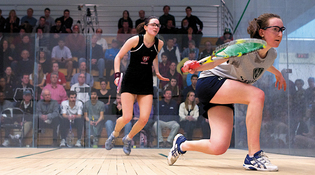 loading
loading
Sporting LifeWinter sports highlights
Alex Goldberger ’08 is an Olympics researcher at NBC.
 Michael T. BelloMillie Tomlinson ’14 (right) battled Harvard's Laura Gemmell in the Ramsay Cup final. View full image
Women’s squash As an elite junior squash player in Derbyshire, England, Millie Tomlinson ’14 was driven by dreams of individual success. But when she arrived at Yale last fall, her freshman-year goal was modest. She just wanted to help the team win. After dropping her first match of the season, Tomlinson rattled off 11 straight wins without losing a single game. She helped the team to a perfect 17–0 season and—with a stirring 5–4 victory over Harvard—its first national championship in six years. Mission accomplished, Tomlinson booked a flight home for spring break. Just one problem: the season wasn’t over. The Ramsay Cup, the individual national championship, was scheduled for the first weekend of vacation, and Yale coach Dave Talbott thought Tomlinson, the team’s number-two seed, should enter. “College squash isn’t as big in England,” Tomlinson says. “So I didn’t even really know what the tournament was. But Coach Talbott said if I did well I could be named All-American. So I changed my flight.” Tomlinson, the seventh seed in the draw, won her first four matches—again, without losing a game—to set up a meeting with Harvard sophomore Laura Gemmell, the defending national champion, unbeaten in 32 college matches. “I actually went in expecting to lose,” says Tomlinson. “But it’s easy going in as a freshman because there was no pressure on me.” Tomlinson played loose and disrupted Gemmell’s attacking, volley-heavy game, winning all three games to become the fifth woman and first freshman in Yale’s history to capture the national title.
Women’s basketball Since starting out with a 3–24 record in 2005–06, Coach Chris Gobrecht has moved the women’s basketball team into the upper half of the Ivy League. This season, after last year’s 8–6 Ivy record, expectations were high. But in November, a slew of injuries prevented Gobrecht’s talented group from taking the court all at the same time, and Yale entered finals week on a seven-game losing streak. “Normally the finals break isn’t the best time to pull your game together,” Gobrecht says. “But we had that finals break and we got healthy.” After exams, Florida State—ranked 14th in the nation at the time—traveled to Yale and faced a different team from the one it had seen on film. Freshman Janna Graf ’14, finally full strength after a bout with mono, poured in 22 points. Forward Michelle Cashen ’12, no longer hobbled by a sprained ankle, pulled down 13 rebounds, and Megan Vasquez ’13 led all scorers with 25 points. Yale led from the opening minutes and won, 91–85, for the program’s first-ever victory over a ranked team. “It was probably the most perfect game I’ve ever had a team play,” Gobrecht says. From there, the Bulldogs went 10–4 in the Ivy League, good enough for second place and a spot in the Women’s National Invitational Tournament. The postseason appearance, Yale’s first since 1979, extended the season by two weeks before a first-round loss to Boston College. “That was a major cultural shift for the program,” Gobrecht says. “You’ve played a long season, you’ve had midterms—that spring break starts to look pretty good. But if you’re a basketball player, you want to be playing basketball in March.”
The comment period has expired.
|
|